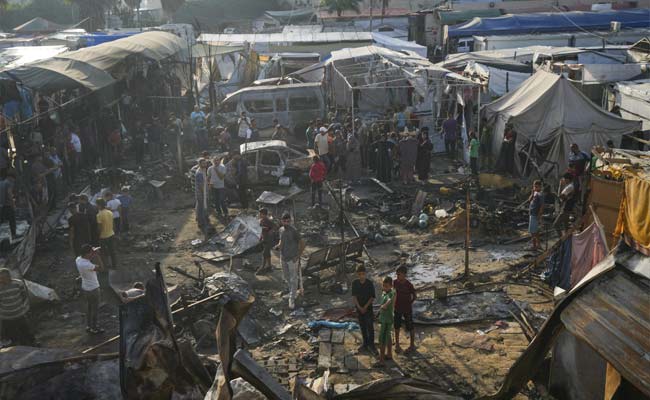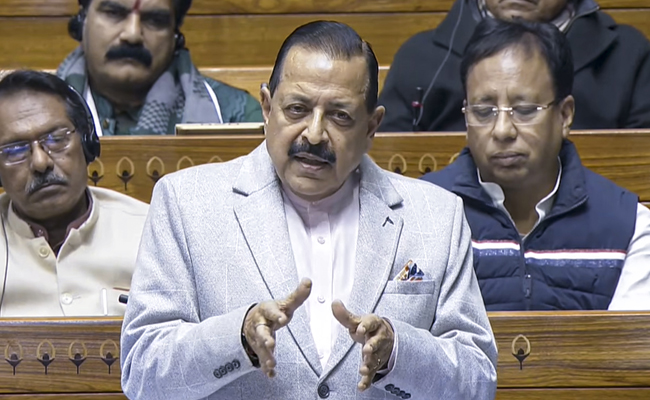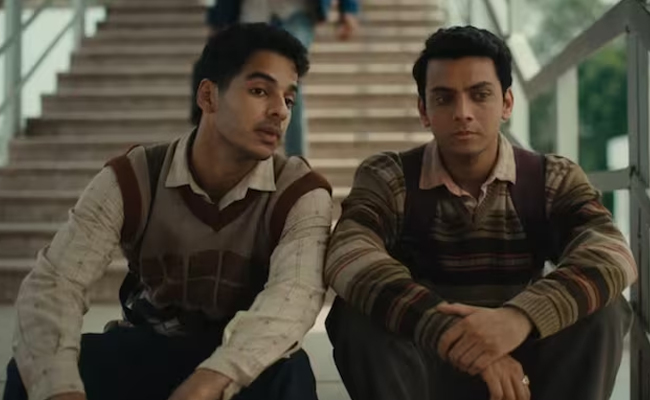Deir Al-balah (Gaza Strip): At least 33 people, including 21 women, were killed in an Israeli airstrike on the Jabalia refugee camp in northern Gaza, according to Hamas-led authorities. The attack, which injured more than 85 people, has worsened the dire humanitarian situation in the densely populated camp, which has been under siege for weeks.
The final death toll is expected to rise, as many residents remain trapped beneath the rubble of homes belonging to three families. Ambulance crews continue recovery efforts, but overwhelmed hospitals are treating injured individuals on the floors due to a lack of space.
Video footage circulating on social media, which has not been independently verified, shows bodies wrapped in white shrouds laid out at al-Awda Hospital. The hospital's director described the influx of casualties as unmanageable, stating, “Our wards are completely full.”
Israeli authorities have not commented on the attack. They claim to have delivered 30 trucks carrying food, water, and medical supplies into northern Gaza, but local officials say aid has not reached heavily impacted areas like Jabalia.
Meanwhile, the humanitarian crisis continues to escalate. The head of the UN's Office for Humanitarian Assistance, Georgios Petropoulos, warned that conditions in Jabalia are "atrocious." Speaking from southern Gaza, he emphasized the urgent need for more relief efforts.
Israel's blockade of northern Gaza remains in place, with Minister Amichai Chikli defending the restrictions as “legal under international law.” He stated that civilians were given an opportunity to evacuate to designated safe zones, but supplies were barred from entering the blockaded areas.
In a parallel development, US President Joe Biden expressed hope for a potential ceasefire in Lebanon, where Israel is engaged in ground operations against Hezbollah militants. However, he admitted that achieving a ceasefire in Gaza would be more challenging.
The airstrike follows the recent killing of Hamas leader Yahya Sinwar, which some had hoped might bring an end to the conflict. However, Hamas deputy leader Khalil al-Hayya declared that hostages taken during the October 7, 2023, attack would not be released unless Israel ends its military campaign and withdraws from Gaza.
Clashes also intensified in Lebanon, with Israel claiming to have killed 60 Hezbollah fighters and destroyed a regional command center. In response, Hezbollah reported rocket attacks on Haifa and nearby areas.
Let the Truth be known. If you read VB and like VB, please be a VB Supporter and Help us deliver the Truth to one and all.
Bengaluru (PTI): A woman was booked on charges of obstructing a police inspector from discharging his official duties and threatening to commit suicide if he did not accept her love proposal, police said on Wednesday.
The 45-year-old inspector attached to the Ramamurthy Nagar Police Station here alleged that the woman repeatedly harassed him, they said.
According to his complaint, the harassment began on October 30, when he started receiving calls from an unknown woman from multiple phone numbers.
During these calls, she allegedly spoke incoherently and claimed to have close links with several highly placed individuals, including the Chief Minister, Deputy CM, Home Minister and other political leaders.
Police said the woman sent photographs via WhatsApp purportedly showing herself with these dignitaries and claimed she could use their influence to compel the inspector to accept her proposal. She also allegedly threatened to use her contacts against him if he refused.
ALSO READ: “Bleeding on the road, I begged for help but no one came”: Bengaluru woman recounts husband’s death
The inspector said that he advised her to visit the police station and submit a written complaint if she had any grievance. However, she did not do so and instead continued to repeatedly call and send messages, which disturbed his official duties, the FIR said.
According to the FIR, on November 7, the woman allegedly visited his office and handed over an envelope containing some tablets along with handwritten letters. The letters contained emotionally charged and inappropriate content, and the woman claimed they were written using her blood, indicating obsessive behaviour.
Despite being clearly informed that the number she was contacting was an official departmental number meant for public service, she allegedly continued making unnecessary calls and messages, causing mental harassment and obstruction to his day-to-day duties, he alleged.
During the inquiry, police learnt that the woman had allegedly exhibited similar behaviour with other police and government officials in the past, it stated.
On December 12, she allegedly went to his police station and shouted and threatened to commit suicide and ruin the inspector's career if he did not respond to her proposal, prompting him to lodge a complaint.
"Based on the complaint, a case was registered against the woman under Sections 132 (assault or criminal force to deter a public servant from discharge of duty), 351(2) (criminal intimidation) and 221 (obstructing a public servant in discharge of public functions) of the Bharatiya Nyaya Sanhita at the Ramamurthy Nagar Police Station. The matter is under investigation," police said.





